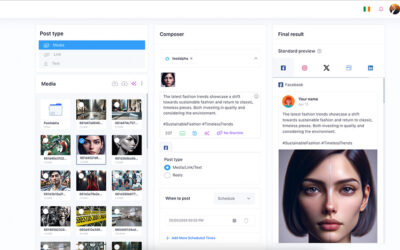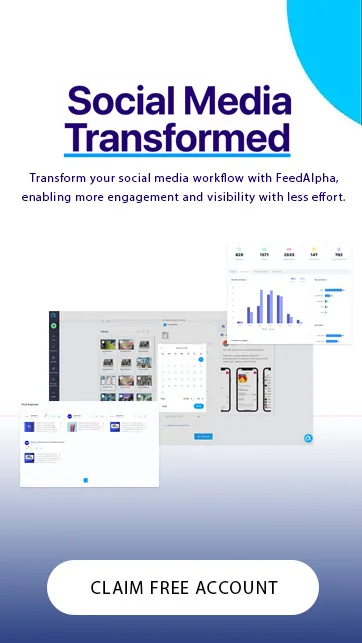Social media has seamlessly integrated into our daily lives, as millions of individuals flock to various platforms to connect with others, information sharing, and pursue new opportunities. Within today’s competitive job market, utilizing the power of social media for recruitment holds paramount importance to recruiters.
This comprehensive guide explores the importance of social media for recruiters. It offers valuable insights and techniques for recruiters to enhance their online presence effectively.
Recruiters can optimize their outreach and improve candidate engagement by implementing streamlined approaches, enabling them to effectively achieve their hiring objectives.
Understanding the Role of Social Media for Recruiters

Social media has brought about a revolution in the recruitment landscape in recent years. It has completely transformed how organizations seek and interact with potential passive candidates. This significant change can be attributed to the widespread adoption of social media platforms, enabling increased connectivity and accessibility for recruiting purposes.
Recruitment efforts have greatly benefited from the expansive reach of social media. With billions of active users around the globe, platforms such as LinkedIn, Facebook, Twitter, and Instagram serve as valuable resources for recruiters in search of exceptional talent.
Traditional recruitment methods often have limited reach as they solely target active job seekers. However, social media presents a game-changing opportunity for recruiters to tap into passive talent pools and connect with a wider audience. By leveraging targeted ads, compelling content, and networking opportunities, recruiters can now reach qualified candidates who may not actively be seeking new opportunities. This opens up a vast pool of potential candidates from which organizations can choose.
One of the main advantages of social media in recruitment is its ability to improve employer branding. Companies can effectively showcase their culture, values, and work environment through captivating and authentic content. This includes sharing compelling employee success stories, highlighting workplace events, and providing industry insights. By doing so, organizations can establish a strong employer brand that attracts top talent.
Choosing the Right Social Media Platforms
Recruiters often find themselves overwhelmed by the multitude of multiple social media platforms available. Each platform boasts unique features and targets specific demographics and professional interests.
To make the best choice(s) for their recruitment process, recruiters should take into account the following factors:
- Target Audience: Different platforms attract varying demographics and professional communities. LinkedIn stands out as the go-to social media platform for professional networking and B2B connections, garnering broad recognition. Conversely, platforms like Facebook and Instagram prove more effective in capturing the attention of a younger, creative audience. Conducting thorough research on each platform’s demographics and user behavior enables recruiters to pinpoint where their target audience is most actively engaged.
- Industry Relevance: Some industries may have particular social media channels that are more popular and applicable. For instance, platforms like Behance and Pinterest frequently support strong creative businesses like design and photography. Recruiters can more effectively target their hiring efforts by having a thorough understanding of the industry environment and discovering the social media channels used by experts in the chosen subject.
- Platform Features: Each social media network has unique features and functionalities that can be used for the hiring process. For instance, LinkedIn offers professional groups, candidate searching controls, and specific job posting features. Ad targeting options and sharing options for graphical content are available on Facebook and Instagram. Recruiters can choose platforms that best meet their recruitment goals by comparing the features and tools offered on each one.
Building a Strong Employer Brand on Social Media

In the current competitive job market, it has become imperative for organizations to establish a strong employer brand on social media. This involves creating a positive perception and reputation as an employer, encompassing various aspects such as values, culture, work environment, and employee experiences.
Utilizing social media platforms effectively to develop and sustain a strong employer brand yields several advantages. Firstly, it plays a crucial role in shaping potential candidates’ perceptions of the organization. By showcasing the company’s culture, values, and distinctive qualities through social media, companies can attract individuals seeking positive work environments and opportunities for professional growth.
Furthermore, having a solid employer brand on social media contributes to greater engagement and satisfaction among employees. When employees feel connected to their organization and take pride in being part of it, they are more inclined to actively share positive experiences with others while advocating for the brand.
To build and maintain a strong employer brand on social media, consider the following tips:
- Define and Communicate Your Employer Value Proposition (EVP): Clearly articulate the unique benefits and opportunities your organization offers to employees. Identify what sets your company apart and emphasize these qualities in your social media content. This will help job seekers understand the value of working for your organization.
- Authenticity and Transparency: Be genuine and transparent in your social media communications. Share real stories, employee testimonials, and behind-the-scenes glimpses of your company culture. This authenticity builds trust and resonates with potential candidates.
- Consistent Branding: Maintain a consistent brand image across all social media platforms. Use consistent colours, fonts, and tone of voice to reinforce your brand identity. This consistency enhances brand recognition and establishes a cohesive social media presence.
- Engage with Your Audience: Respond promptly to comments and messages on social media platforms. Actively engage with your audience by asking questions, initiating discussions, and showcasing an appreciation for their input. This two-way interaction fosters a sense of community and builds stronger connections with potential candidates.
- Employee Advocacy: Encourage employees to share their positive experiences on social media. Provide them with resources and guidelines to become brand ambassadors. Employee-generated content humanizes the brand and increases credibility.
Creating a Content Strategy

An effective social media recruiting strategy requires a clearly defined content plan. Organizations may continuously supply pertinent and engaging information to their consumers with the aid of a content marketing plan. It guarantees that social media posts match the employer brand, are consistent with recruiting objectives, and effectively convey job openings and corporate culture.
The value of a content strategy for social media recruiting rests in its capacity to draw in the best applicants, promote the employer brand of the business, and increase engagement. Organizations may provide a unified and appealing story that appeals to potential applicants by proactively organizing and producing content.
To create a content strategy for social media recruitment, consider the following tips:
- Define Objectives: Clearly define your recruiting objectives and make sure they are in accordance with your entire talent acquisition plan. Determine the main ideas, topics, and objectives you want to get over in your social media material.
- Understand Your Target Audience: Carry out research to learn about the demographics, interests, and preferences of your target audience. Create content that is tailored to their unique needs and desires. You may develop material that speaks to their interests and problems by knowing their difficulties and goals.
- Content Mix: Develop a diversified content mix that combines job advertisements, highlights of the corporate culture, quotes from employees, industry analysis, and thought leadership content.
- Visual Appeal: Images, videos, and infographics all increase engagement and draw greater attention to the content that they represent. Make an investment in producing aesthetically appealing posts that successfully convey messages and capture the spirit of your employer brand.
Automating Social Media Tasks

For recruiters, automation solutions may greatly simplify their social media duties, saving them time and effort while yet keeping a vibrant and interesting presence on the internet. Certain social media tasks can be automated to promote productivity, uniformity, and the capacity to schedule content in advance.
Here is an overview of some popular tools available for social media automation:
- Social Media Management Platforms: Recruiters may manage many social media accounts from a single dashboard with the help of tools like feedalpha, Hootsuite, Buffer, and Sprout Social. These platforms streamline the sharing of content by enabling the scheduling, publishing, and monitoring of posts across several platforms.
- Content Curation Tools: Resources like Feedly and Pocket assist recruiters in finding interesting and pertinent content to publish on social media. They compile content from multiple sources, enabling recruiters to curate and share pieces on thought leadership, trends, and news in the field.
- Social Media Listening Tools: Social media listening tools are available to track mentions of your business, competitors, or pertinent industry terms in real time on social media platforms. Examples include Mention and Brand24. With the use of these technologies, recruiters may stay up to current on prospect interests, market mood, and business interactions.
Leveraging Social Media for Candidate Engagement
Building relationships, fostering connections, and turning passive prospects into active applications all depend on how you interact with potential candidates on social media. The capacity of social media to forge deep connections, build trust, and promote an organization’s culture and principles makes candidate involvement on the platform crucial.
Here are some tips on how to effectively engage with candidates:
- Respond to Comments and Messages: Answer questions and direct messages from prospective candidates promptly. Take a sincere interest in their questions, give them useful information, and answer any worries they may have. This responsiveness conveys to candidates your company’s dedication to their satisfaction and makes a good first impression.
2. Host Live Q&A Sessions: Set up live Q&A sessions on social media sites so that applicants may ask questions about open positions, the workplace environment, or the application procedure. This interactive method encourages participation, develops trust, and offers passive job candidates insightful information.

Using Analytics to Improve Recruitment Efforts
Social media analytics help recruiters make data-driven decisions and improve their strategies by offering insightful information on the efficacy of recruitment efforts. Social media analytics are crucial for recruitment since they can track results, pinpoint areas for development, and hone recruitment strategies.
Here’s how understanding these analytics can improve recruitment efforts:
- Performance Tracking: To evaluate the effectiveness of your social media content, examine engagement indicators like likes, comments, shares, and click-through rates. Determine the content categories that connect with your audience the most, then copy effective strategies.
- Candidate Conversion: Utilize analytics to monitor the number of applicants who applied via social media, visited your careers page, or clicked on job advertisements. This data supports judgments regarding resource allocation and aids in assessing how well social media platforms convert candidates.
- Audience Insights: Social media analytics give you demographic data on your followers, such as their age, geography, and occupation. Using this information, recruiters are better able to understand their target market and may target particular demographics and talent pools while also customizing content.
- Referral Tracking: Keep track of the social media sites or marketing initiatives that are bringing in the most qualified prospects. With this information, recruiters can concentrate their efforts on the platforms that produce the best outcomes and change their methods as necessary.
- Return on Investment (ROI): Social media analytics can be used to track recruitment-related costs and correlate them with candidate acquisition and conversion statistics to determine the ROI of recruitment activities. Using this information, recruiters may allocate their resources more wisely and maximize their budget.
Staying Updated with Social Media Trends

For recruiters to remain relevant, respond to developments, and effectively interact with potential candidates, they must keep up with the most recent social media trends. The significance of keeping up with social media trends stems from the dynamic nature of these platforms, which are always changing due to new features, user behaviour, and emergent platforms.
Here are some tips on how to stay informed and adapt to changes in social media:
- Follow Industry Influencers: Find and follow thought leaders, subject matter specialists, and influencers who frequently talk about social media and hiring-related issues. They frequently exchange knowledge, trends, and best practices that might assist recruiters in keeping up with the most recent advancements.
- Attend Webinars and Conferences: Attend webinars and conferences that are centred on social media and hiring. These platforms offer chances to interact with professionals, participate in conversations, and keep up with new trends.
- Join Professional Groups and Communities: Join pertinent professional communities on social media sites and take part in discussions. These clubs frequently give possibilities for networking and knowledge sharing, sharing insightful information, and talking about current business trends.
Conclusion
In the ever-evolving landscape of recruitment, social media has emerged as a powerful tool for building a strong employer brand, engaging with candidates, and optimizing recruitment efforts.
By understanding the role of social media in recruitment, harnessing its benefits, and effectively navigating its challenges, recruiters can tap into vast talent pools, showcase their organization’s culture and values, and create meaningful connections with potential candidates.
From building a captivating employer brand to leveraging data-driven analytics and staying updated with the latest trends, a comprehensive approach to social media recruitment ensures recruiters stay ahead in the competition for top talent.
So, embrace the power of social media, unleash its potential, and pave the way for recruitment success in the digital era.
How to Show as offline on Instagram
Heads up: Your Instagram buddies can see when you’re online! Imagine this: You’re chilling, scrolling through Reels, when a friend starts bombing you with not-so-funny memes. The endless pinging is enough to drive anyone mad. Worse still, they can see you’re online...
What’s new in V2: A look at the new features launched in Feedalpha
First, a note from the CEO At its core, Feedalpha has always been a content curation and social media management platform that helps users stay updated with the latest trends and topics relevant to their industry or personal interests. We grew the business to 11,000 +...




